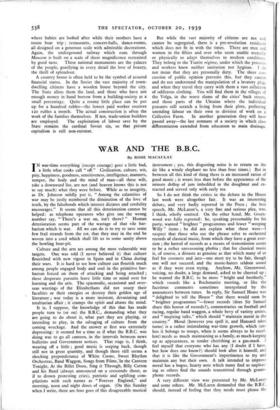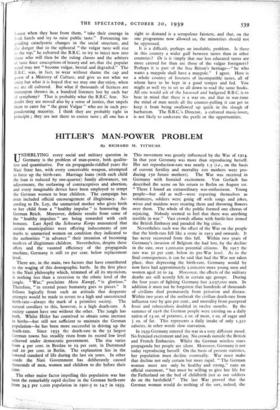WAR AND THE B.B.C.
By ROSE MACAULAY
IN war-time everything (except courage) goes a little bad, a little what cooks call "off." Civilisation, culture, wit, pity, happiness, goodness, sensitiveness, intelligence, manners, temper, the body and the mind of man—all these wilt, take a downward list, are not (and heaven knows this is not to say much) what they were before. While as to integrity, as Dr. Johnson mildly put it, "Among the calamities of war may be justly numbered the diminution of the love of truth, by the falsehoods which interest dictates and credulity encourages." It seems that all this deterioration cannot be helped: as telephone operators who give one the wrong number say, "There's a war on, isn't there?" Human deterioration seems part of the wastage of that vile bar- barism which is war. All we can do is to try to save some few frail strands from the rot, that they may in the end be woven into a cord which shall lift us to some sanity above the howling bear-pit.
Culture and the arts are among the most vulnerable war targets. One was told (I never believed it) that culture flourished with new vigour in Spain and in China during their wars. It is hard to see how culture can flourish much among people engaged body and soul in the primitive bar- barism forced on them of attacking and being attacked ; these desperate pursuits leave little time or mind over for learning and the arts. The spasmodic, occasional and over- seas warrings of the Elizabethans did not usurp their faculties or their energies or destroy their golden age of literature ; war today is a more insistent, devastating and totalitarian affair ; it cramps the spirit and abates the mind.
It is, I suppose, the knowledge of this that has made people turn to (or on) the B.B.C., demanding what they are going to do about it, what part they are playing, or intending to play, in the salvaging of culture from the coming wreckage. And the answer at first was extremely depressing: it seemed for a time as if what the B.B.C. was doing was to go all canteen, in the intervals between news bulletins and Government notices. That stage is, I think, wearing off a little ; good music is seeping back, though still not in great quantity, and though there still seems a shocking preponderance of White Coons, Sweet Rhythm Orchestras, Band Waggon, Songs from Films;In the Canteen Tonight, At the Billet Doux, Sing it Through, Billy Cotton and his Band (always announced on a crescendo shout, as if to drown protesting cries), patriotic and uplifting com- pilations with such names as "Forever England," and morning, noon and night doses of organ. (On this Sunday when I write, there are four goes of this disagreeable musical instrument ; yes, this disgusting noise is to return on the air like a windy elephant no less than four times.) But in between all this kind of thing there is an increased ration of good music ; it wears less than before the appearance of the minute dollop of jam imbedded in the doughnut and ex- tracted and served only with early tea.
So I do not think the critics in the debate in the House last week were altogether fair. It was an interesting debate, and very badly reported in the Press ; the best speech, Mr. McLaren's, a very fine and serious plea, was, I think, wholly omitted. On the other hand, Mr. Green- wood was fully reported: he, speaking presumably for his party; wanted " brighter " programmes and fewer "weeping Willy" items ; he did not explain what these were—I suspect that those who use the phrase refer to orchestral records of classical music, from which they have a great aver- sion ; the hatred of records as a means of transmission seems to be a rather unreasoning phobia ; that for classical music is, of course, a distaste as genuine as that which many of us feel for crooners and jazz—one must try to be fair, though one will not succeed, and the music-haters seldom sound as if they were even trying. Anyhow, Mr. Greenwood, voicing, no doubt, a large demand, asked to be cheered up ; he wanted the B.B.C. to be more "bright and brotherly," which sounds like a Buchmanite meeting, or like the facetious comments sometimes interpolated by the announcers between tunes. In reply, Sir Samuel Hoare was "delighted to tell the House" that there would soon be "brighter programmes "—fewer records (does Sir Samuel share this horror of records?), commentaries on football and racing, regular band waggon, a whole bevy of variety artists, and "inspiring talks," which should "maintain moral in the country." Moral (however you spell it, and Hansard takes turns) is a rather intimidating war-time growth, which (un- less it belongs to troops, when it seems always to be excel- lent) needs as much maintaining as a family, as much keeping up as appearances, as tender cherishing as a gas-mask. I feel myself that everyone who has any (I doubt if I have, but how does one know?) should look after it himself, and that it is like the Government's impertinence to try and maintain any but their own. A talk intended to improve moral has a bogus, hearty note which many find as unpleas- ing as others find the sounds transmitted through gramo- phone records. A very different view was presented by Mr. McLaren and some others. Mr. McLaren demanded that the B.B.C. should, instead of feeling that they needs must please the lowest when they hear from them, "take their courage in lz.oth hands and try to raise public taste." Foreseeing im- pending cataclysmic changes in the social structure, and the danger that in the upheaval "the vulgar taste will rise to the top," he exhorted the B.B.C. to try to inject now into those who will then be the ruling classes and the arbiters of taste finer conceptions of beauty and art, that the popular mind may not "become vulgar, bestial and degraded." The B.B.C. was, in fact, to wear without shame the cap and gown of a Ministry of Culture, and give us not what we enjoy but what it is hoped that we may one day enjoy, when we are all cultured. But what if thousands of licences are thereupon thrown in, a hundred listeners lost by each bar of symphony? That is probably what the B.B.C. fear. No doubt they are moved also by a sense of justice, that impels them to cater for "the great Vulgar" who are in such pre- ponderating majority. I think they are probably right in principle ; they are not there to coerce taste ; all one has a right to demand is a scrupulous fairness, and that, on the one programme now allowed us, the minorities should not be oppressed.
It is a difficult, perhaps an insoluble, problem. Is there in this country a wider gulf between tastes than in other countries? Or is it simply that our less educated tastes are more catered for than are those of the vulgar foreigners? Perhaps it is part of the free Briton's heritage—" he who wants a maypole shall have a maypole." I agree. Here is a whole country of listeners of incompatible tastes, all of whom have to be kept in a good temper and fed. You might as well try to set us all down to read the same books. All one would ask of the harassed and badgered B.B.C. is to bear in mind that there is a war on, and that in war-time the mind of man needs all the counter-pulling it can get to keep it from being swallowed up quick in the slough of barbarism. The B.B.C.'s Director, a cultured music-lover, is not likely to underrate the perils or the opportunities.













































 Previous page
Previous page